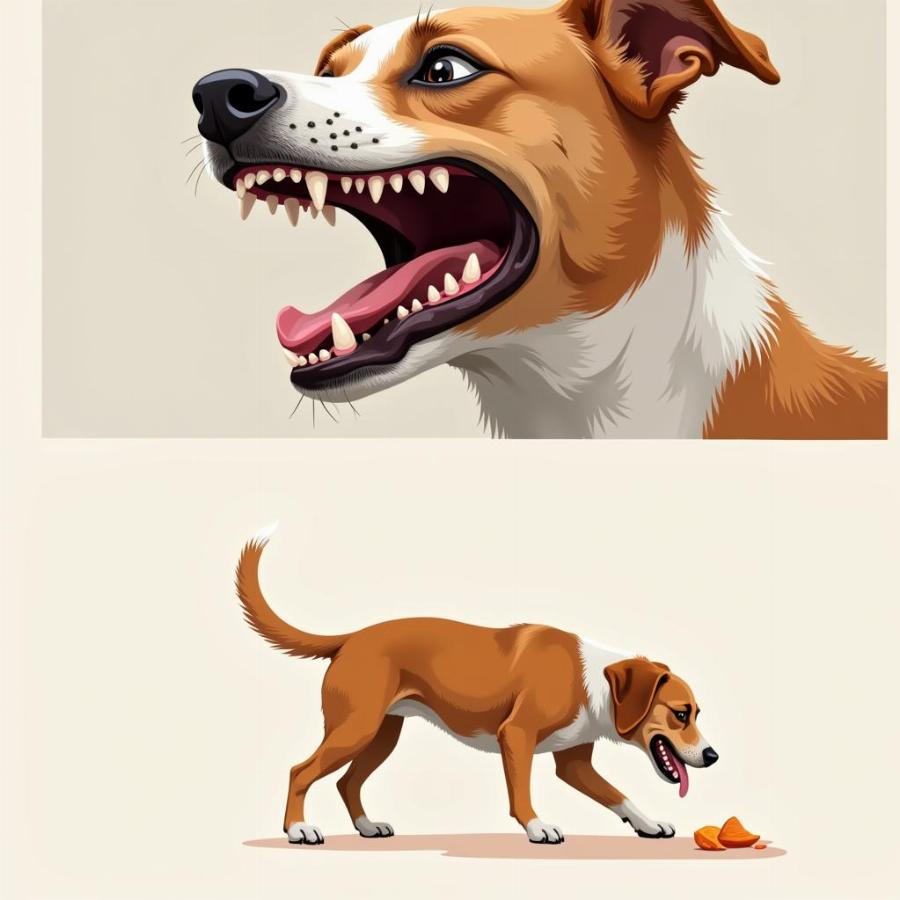Overbite in dogs, also known as malocclusion, is a condition where the upper jaw extends further forward than the lower jaw. While a slight overbite is normal in some breeds, a severe overbite can cause a range of health and comfort issues for your furry friend. This comprehensive guide will explore the causes, symptoms, and treatment options for dog with overbite, helping you ensure the best possible care for your canine companion.
What Causes Overbite in Dogs?
Overbite in dogs can be caused by a variety of factors, including genetics, breed predisposition, and early tooth loss. Certain breeds, like Bulldogs and Pugs, are more prone to developing an overbite due to their brachycephalic (short-nosed) skull structure. Early loss of baby teeth can also disrupt the proper alignment of the adult teeth, leading to an overbite. Understanding the underlying cause of your dog’s overbite is crucial for effective management.
Recognizing the Signs of Overbite
How can you tell if your dog has an overbite? While a mild overbite might be barely noticeable, more severe cases present distinct signs. Look for difficulty eating, excessive drooling, and the upper teeth visibly overlapping the lower teeth. In some cases, the lower teeth might even make contact with the roof of the mouth, causing discomfort and potential injury.
 Dấu hiệu nhận biết chó vẩu
Dấu hiệu nhận biết chó vẩu
Treatment Options for Dog With Overbite
The treatment for dog with overbite varies depending on the severity of the condition and the age of the dog. For puppies, early intervention might involve orthodontic appliances like dog braces for overbite to correct the jaw alignment. In adult dogs, surgery might be necessary to reshape the jaw or extract problematic teeth. Less severe cases might be managed with regular dental care and a special diet.
Living with a Dog with an Overbite: Tips and Considerations
Living with a dog with overbite meme can require some adjustments. You might need to offer specially formulated food to make eating easier. Regular dental checks are essential to prevent infections and gum disease. Remember, even with an overbite, your dog can live a happy and healthy life with proper care and attention.
Can Overbite Affect a Dog’s Quality of Life?
Absolutely. A severe overbite can make it difficult for a dog to eat, drink, and even play. It can also lead to dental problems, such as gum inflammation and tooth decay. Addressing the overbite can significantly improve your dog’s quality of life. “Early intervention is key,” says Dr. Emily Carter, DVM, “especially in puppies. Early treatment can often prevent more serious problems down the road.”
Preventing Overbite in Dogs: Is it Possible?
While some causes of overbite, like genetics, are unavoidable, you can take steps to minimize the risk. Ensure your puppy receives proper nutrition for healthy tooth development. Avoid tug-of-war games that could damage the developing jaw. Regular veterinary check-ups are crucial for early detection of any potential dental issues, including overbite in dogs.
Conclusion: Providing the Best Care for Your Dog With Overbite
Overbite in dogs is a manageable condition, particularly with early detection and appropriate treatment. By understanding the causes, symptoms, and available options, you can ensure your canine companion receives the care they need to thrive. Don’t let an overbite hold your dog back from a happy and healthy life.
FAQ
- Is overbite common in dogs? Yes, especially in certain breeds.
- Can overbite be corrected in adult dogs? It depends on the severity, but options like surgery are available.
- Does overbite cause pain for dogs? Severe overbites can lead to discomfort and difficulty eating.
- How often should I take my dog with an overbite to the vet? Regular dental check-ups are crucial.
- What kind of diet is recommended for dogs with an overbite? Soft food or specially formulated kibble might be necessary.
- Is an level bite in dogs better than an overbite? A level bite is generally considered the ideal bite for most breeds.
- Can a dog arm bite be related to an overbite? While not directly related, bite strength can be affected by jaw alignment.
Beaut Dogs is your trusted source for all things canine, offering expert advice and valuable insights into the world of dog breeds. We provide comprehensive information on dog care, health, nutrition, training, and more. For any questions or concerns regarding your furry friend, please don’t hesitate to contact us at Email: [email protected] for detailed and accurate assistance. Visit Beaut Dogs today to learn more!